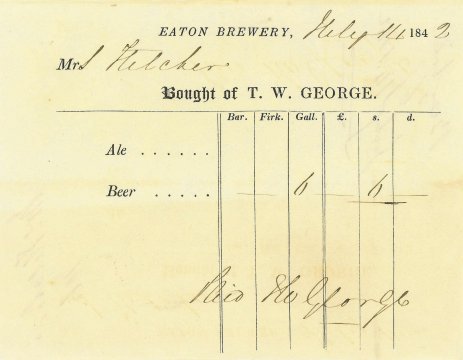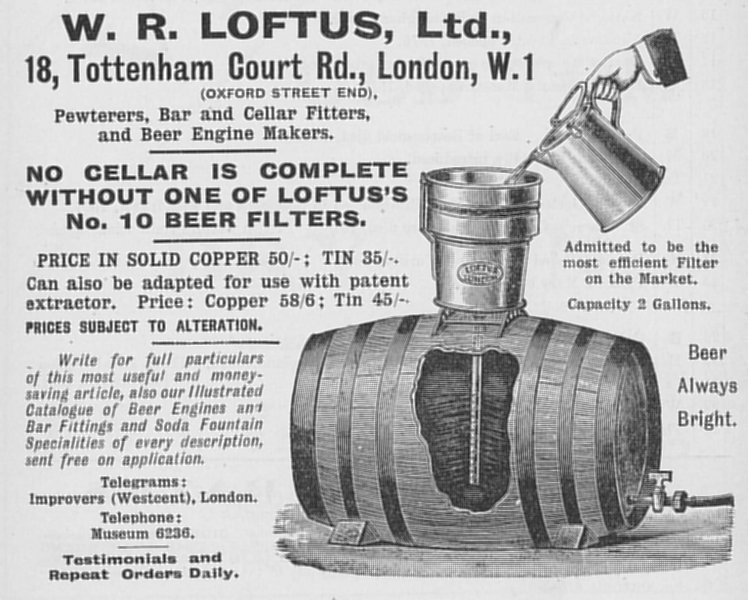NORFOLK PUBLIC HOUSES
|
A selection of Pub & Brewing related material. |
|
|
|
||||||||||||
|
|
|
|||||||||||||
|
PIN = 36 pints = 4.5 gallons
FIRKIN = 72 pints = 9 gallons KILDERKIN = 144 pints = 18 gallons BARREL = 288 pints = 36 gallons HOGSHEAD = 432 pints = 54 gallons BUTT = 864 pints = 108 gallons TUN = 1728 pints = 216 gallons |
||||||||||||||
|
It was reported in the Norfolk Chronicle of 3rd March 1786 that a
coal-porter in Pimlico, London had untaken a wager of 5 Guineas to drink a BUTT
of porter within 21 hours. He had on a previous occasion, at the Swan,
Hammersmith, drunk 21 quarts of pale porter in one hour and twenty-one
minutes. The outcome of the attempt has yet to be discovered. At the Kings Lynn Brewster Sessions, Monday 12th February 1912 it was confirmed that following the recent declaration that penny-in-the-slot machines were illegal, all such machines had been removed from licensed houses in the borough. CASK ALE = Beer allowed to mature by secondary fermentation in the cask (Barrel). Either served from a tap on the container or via a bar mounted suction pump (Hand pump) Known by some as Real Ale. KEG BEER = Filtered and pasteurised and stored in barrels pressurised with either nitrogen or carbon dioxide. Usually served chilled. In September 1889. an un-named inventor claimed to have perfected the process of turning champagne, sherry, brandy and whisky into a powder. When diluted with water they made excellent wines and spirits with all the delights of intoxication without inebriety. A quart of the strongest whisky could be drunk without any ill effect. At the Vienna Exhibition of 1873, the only `British' beer to win a Medal was by William Younger and Co of Edinburgh. This was the 5th medal awarded to the firm during the past three years. Messrs. Dunville and Co, Royal distilleries, Belfast were awarded a Medal of Merit for purity and excellence of quality of their Celebrated Old Irish Whisky. It was reported October 1846 that the price of Barley was £1 12s a quarter and Malt Duty was £1 1s 8d on top. This was then sold to the Maltster for £2 13s 8d plus a profit of 5s 4d. The Brewer paid £2 19s plus a profit of 6s, to the Maltster. The Publican paid £3 5s plus a profit of 6s 6d, to the Brewer. The Consumer paid £3 11s 6d for the quarter of barley. (Profit to the Publican not mentioned) |
|
|||||||||||||
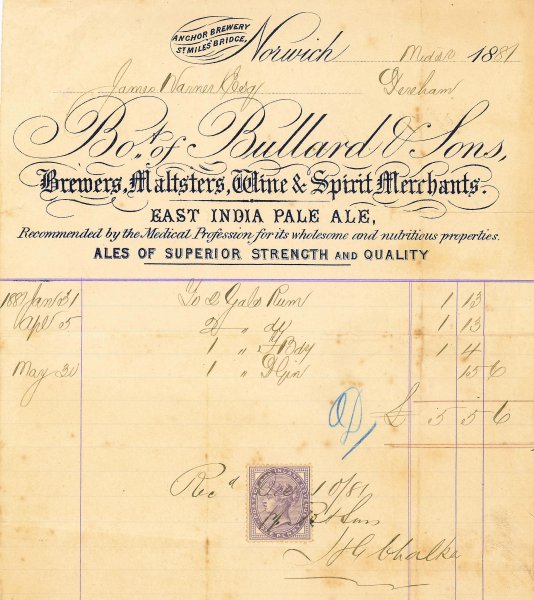 TRADE PRICES in 1881 1 gallon of brandy for 24/- 1 gallon of rum for 16/6d and 1 gallon of gin for 15/6d Sold in measures of 1/6th gill (192/gallon) That is about 1½d for the brandy and 1d for a tipple of rum or gin. |
For the period Midsummer 1748 to Midsummer 1749 the Excise on Beer and
Ale amounted to £1,385,420, some £200,000 more than the previous year. The Retail Beer Act of 1838 fixed week-day opening hours for the period 10th October to 6th April to be from Six in the Morning to Ten in the Evening. For the remaining part of the year from Five in the Morning to Eleven in the Evening. On Sundays houses were restricted to open between One and Two-thirty in the Afternoon and between Five and Ten in the Evening. The same on Good Friday, Christmas Day or any other day appointed for Public Thanksgiving. The 1853 Betting Act made it illegal for any license holder to a). suffer any gaming or unlawful game to be held on his premises or b). open, keep, or use his premises in contravention of the said act, or suffer his premises to be opened, kept, or used in contravention of the said act. A first offence would be liable to a fine not exceeding £10 for each offence. Each subsequent offence would suffer a fine not exceeding £20. In 1971 Watney Mann were running 8 breweries and almost 6,000 pubs throughout the UK. |
|||||||||||||
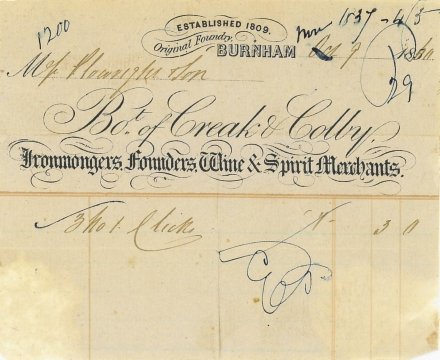
|
||||||||||||||
|
|
||||||||||||||
|
BEER ACTS:-
Under Edward VI, in 1552, licensed victuallers were required to appear before two Justices at the quarter sessions in order to certify their behaviour. Licence renewal could be refused if the conduct of the house fell short of expectations. By 1753 a register of licensees (Recognizances) was to be presented to the Justices at annual Brewster Sessions, held in September. (Alehouse Recognizances existed from at least the mid 1600's) In December 1848 it was reported that drunkenness was not such a big problem as it had been in earlier years. For instance in 1736 it was not uncommon for publicans to paint above their doors that "You may get drunk here for a penny, dead drunk for twopence and have clean straw for nothing". Legislation had imposed a 20s per gallon on spirits and prohibited sale by retail. This had led to clandestine sales of gin which in turn resulted in some 12,000 people being convicted, 5000 of whom had been fined £100 and 3000 who had been fined £10. In 1742 there were three gallons of spirits produced for each member of the population, per year. By 1848 the population was some sixteen million persons and spirit production was 8,166,985 gallons, or half a gallon per head. In the Westminster election of May 1807, Mr. Sheridan said it was not his intention to fall foul of the Brewer, a trade in which he respected many individuals, such as Mr. Whitbread, Mr. Combe and Mr. Calvert, but just before the dissolution of Parliament, he had been about to introduce a Bill preventing brewers from owning public houses. His aim was to protect the publican who was unable to provide the products from the best source. It was not possible for the publican, who was provided with an inferior product, seeking supply elsewhere without changing their habitation and situation. Mr. Sheridan also said that the Magistrates of Westminster, paid and pensioned by the Government, had the power to remove the licence of any publican, without assigning any reason and without the option of appeal. This was an improper power for freemen to allow to be exercised by any Magistrate. The Retail Beer Act of 1824 gained Royal Assent in June 1824 and came into effect on 5th July. Under the act any Brewer, retailing beer from his premises, to be consumed elsewhere, was to pay Five Guineas per annum, payable 10th October. War duties on beer, wine and spirit were removed, but other duties remained. Any house valued at under £20 a year would be charged One Guinea for a beer licence. Brewers were not allowed to sell Table Beer in the same shop as Strong Beer. Brewers were not allowed to mash less than two quarters of malt at each brewing and were not entitled to renew their licence, unless they paid duty for 100 barrels a year. Brewers were not to retail beer except between the hours of six in the morning and nine in the evening, nor during divine service on Sundays. Persons prevented from keeping a common inn by conviction could not take out a retail brewers licence. The Acts passed by Charles II, prohibiting the loan of brewing utensils, were repealed. Wholesale Brewers were allowed one barrel in twelve, duty free. Retail brewers were not given any allowance for waste. At the Sessions for the County, Wednesday 22nd February 1823, the Chairman Mr. Henry Dover, called for the attention of the Jury, to the subject of Beer-houses. `Which he observed were public nuisances, from becoming the receptacles of drunken and dissolute persons and where crimes are planned. it was not for him to say whether the Legislature would think it advisable to make any alteration to the existing laws, but all persons, particularly the Magistracy, were called upon to exert themselves to put the provisions of the present Act in force; by compelling such houses to be shut during divine service, and to be closed at ten o'clock at night; and it should be understood, for the information of the public, as well as keepers of such houses, that though the doors were closed, if there were persons in the houses at, or after the times mentioned, it amounted to keeping the house open contrary to the Act and subjected the parties to penalties.' Acts passed between 1828 and 1830 removed all control from the Justices and many beer houses appeared. At the Grand Jury Chamber, Norwich, Friday 8th April 1831, the Viscount Melbourne stated by letter, that he had been approached from various quarters concerning the numerous shops opened for the sale of Beer under the provisions of the 1st William 4th, c51 and was desirous of ascertaining if the fears were well founded. Colonel Wodehouse said he was "sensible of the bad effects of these houses" it was the unanimous decision of the Court that the morals of the country had been injuriously affected by such houses. It was resolved that the Court had "too much reason to believe that many of the houses, frequented by the most profligate and dangerous characters, gave great encouragement to the scenes of riot and insubordination". The houses were so numerous that it was impossible for the Civil Powers to sufficiently overlook them. However the Court believed that good would arise from "encouraging competition in the sale of beer, provided it was free of the present system". The Reverend John Fellowes said that in his own parish, before the late Act, there was no public house at all, but there were now 5 beer-shops. <He lived at Shottesham Park> The Chairman stated that 25,000 beerhouses had opened, besides 45,000 public houses in England. The Beer Act passed 15th August 1834 required Commissioners of Excise to issue licenses for the sale of beer or cider, but not to be drunk in the house or premises, unless the certificate of good character of the applicant could be sworn by six respectable parishioners. (Each rated at no less than six pounds) The same Act allowed billeting of soldiers on licensed premises, but only if an `on' licence was held. Also the Justices of the Peace were to fix, once a year, at some time between 20th August and 14th September the hours at which licensed houses could trade. In no case was this to be before five in the morning or after eleven at night; or before one o'clock in the afternoon on a Sunday, Good Friday, Christmas Day, or any Fast or Thanksgiving Day. The 1834 Act allowed police to enter premises whenever they thought fit and refusal of admission was liable to a fine of £5. A second such offence was liable to a conviction leading to the prevention of selling beer etc., for a period up to 2 years. A Certificate was NOT REQUIRED for any house in London and Westminster, nor any town or city with a population exceeding 5,000, NOR within the distance of one mile from the last polling place for Members of Parliament. Under Queen Victoria, in 1840, no house with a rateable yearly value under £8 could be granted a licence to sell beer. Proof of rateable value had to be presented to the clerk of the peace. 14th October 1847 - A bill came into force prohibiting any public house, or place of amusement, from remaining open after midnight on a Saturday or to open before 30 minutes after noon on a Sunday, or to open before termination of divine service on a Sunday, Christmas Day, Good Friday or any day appointed for public fast or thanksgiving, under a penalty not exceeding £5. (Sale to travellers was exempt.) 15th July 1869 - The Beer Act made alterations to the laws regarding the sale of beer, cider and wine. Hitherto it had been permitted to grant a licence for a beerhouse, without any requirement as to the personal fitness of the applicant. From the above date the justices of the peace could only issue licenses at the annual licensing day or at special sessions and satisfactory evidence of good character of the applicant must be given. Evidence of unruly behaviour at the house, or of being frequented by prostitutes or persons of bad character would result in refusal of licence. The police were given powers to enter any beerhouse and should there be any drinking of beer at any time outside of legal hours, irrespective of the culprit being a lodger or otherwise, a penalty of 40s could be imposed. Any person, other than a servant or inmate, discovered on the premises outside of legal drinking hours would also be liable of a fine of 40s each.
|
||||||||||||||
|
|
||||||||||||||

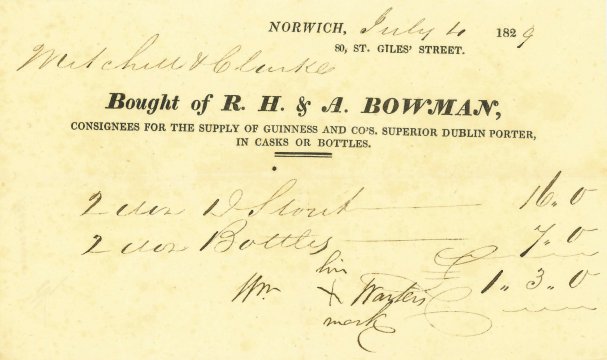
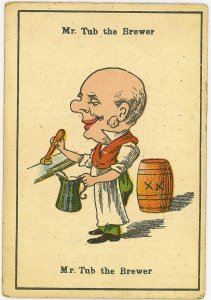
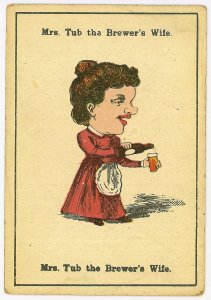
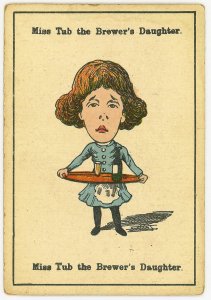
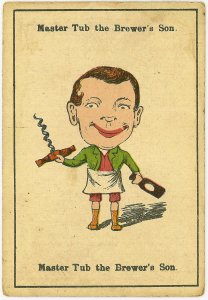
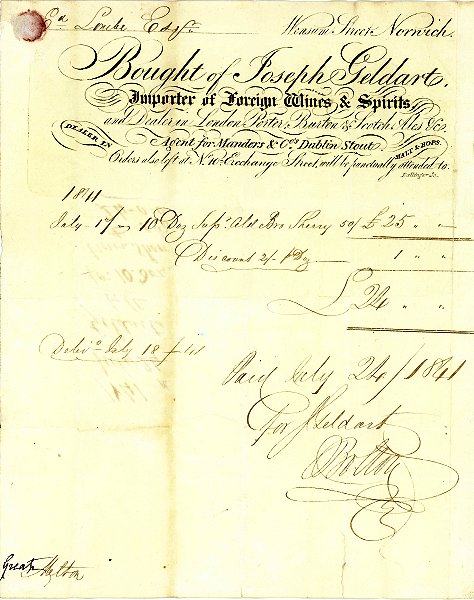 `
`